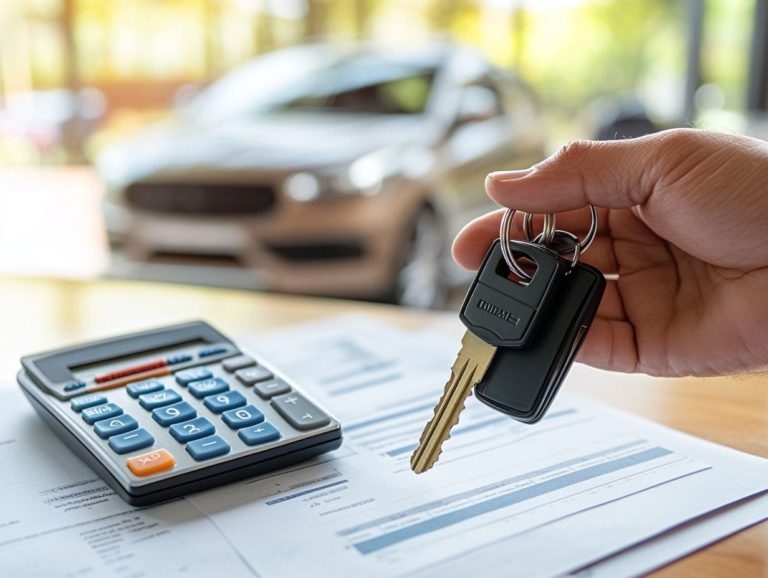How to Approach a Used Car Purchase
Purchasing a used car can be a savvy financial choice, presenting you with substantial savings and numerous benefits.
As you navigate the used car market, it’s essential to thoughtfully assess your budget and personal requirements. From identifying trustworthy vehicles via online platforms and dealerships to thoroughly inspecting key features and skillfully negotiating the best price, each step is vital for ensuring a rewarding purchase.
This guide will help you navigate every step with ease and confidence!
Contents
Key Takeaways:

Buying a used car saves money and can lower your insurance.
Research your budget and the vehicle s history thoroughly.
Inspect the engine, tires, and brakes carefully.
Negotiate prices and know when to walk away if it’s not right.
Consider the pros and cons of different financing options, like bank loans or dealer financing.
Act fast! Finalize the purchase by ensuring all necessary documents are in order and take the car for a test drive before making a final decision.
Benefits of Buying a Used Car
Opting for a used car presents a wealth of advantages that can translate into substantial cost savings when compared to acquiring a new vehicle. The depreciation of new cars tends to plummet dramatically within the initial years, positioning a certified used option as an appealing choice for the discerning car buyer.
Get insights into average prices and ownership history to easily navigate the used car market, uncovering the best deals available.
Cost Savings and Other Advantages
One of the primary advantages of purchasing a used car is the significant cost savings, which can greatly benefit you in the long run. This financial relief often extends beyond just the initial purchase price, as you ll typically encounter lower insurance rates for used vehicles, making your ongoing expenses far more manageable.
Many certified used cars come with dealership warranties, providing you with that coveted peace of mind and protection against unexpected repairs. It s also essential for you to review maintenance records, ensuring you select a vehicle with a dependable history.
This thorough evaluation not only helps you avoid potentially costly future issues but also enhances your overall ownership experience, fostering long-term satisfaction with your purchase.
Factors to Consider Before Purchasing

Before you buy a used car, it’s essential to consider several factors that can influence both your budget and your overall satisfaction with your decision. Reviewing the do’s and don’ts of used car buying includes utilizing research tools and exploring financing options to ensure that you make an informed choice.
Budget, Needs, and Research
Establishing a clear budget is an essential first step in your journey of buying a used car, along with identifying your personal needs and conducting thorough research to discover the best options, including how to avoid scams when buying used cars.
By evaluating your financial priorities and potential expenses, you can create a budget that accommodates not only your monthly payments but also insurance, maintenance, and fuel costs.
The importance of online research cannot be overstated; diving into various platforms allows you to explore current market trends, price ranges, and vehicle specifications tailored to your unique requirements.
Utilizing comprehensive pricing guides can be crucial for determining the trade-in values of your current vehicle. This information empowers you to negotiate smarter and facilitates your search for vehicles that align perfectly with your established budget, ultimately leading to a more informed and confident purchase decision.
Where to Find Quality Used Cars
Finding quality used cars can be achieved through various channels. Explore online marketplaces, where convenience meets an extensive selection.
Reputable dealerships offer assurance and warranties, while private sellers can present unique deals you won’t find elsewhere. Even auctions provide intriguing opportunities for savvy buyers.
Each option has advantages tailored to your needs.
Online Marketplaces and Dealerships

Online marketplaces and dealerships are essential resources in your quest for quality used cars. They offer a diverse array of options and streamline the negotiation process.
These platforms enable you to compare prices, features, and vehicle histories effortlessly. This makes your search more efficient.
Car dealers are invaluable in navigating negotiations. They provide seasoned advice and insights that help you secure the best possible terms.
Their expertise shines, especially when it comes to understanding vehicle pricing and hidden costs.
Before finalizing your purchase, it’s crucial to conduct a visual inspection of the car. This hands-on assessment allows you to evaluate the vehicle’s condition up close, addressing any concerns and leading to more informed decisions.
How to Inspect a Used Car
Conducting a thorough inspection of a used car is crucial for ensuring its quality, safety, and overall reliability.
Focus on critical features and carefully review the vehicle history to make an informed choice.
Important Features to Check
When inspecting a used car, several key features deserve your careful attention. Look at the vehicle’s mileage, maintenance records, and the number of previous owners.
These factors provide invaluable insights into the car’s overall condition and potential longevity.
For example, mileage isn t just about the number on the odometer, which is the device that shows how far a car has traveled; it s vital to consider how it relates to the car s age and usage.
Low mileage might seem appealing, but it doesn t always guarantee a pristine condition. Sometimes, a lack of use can lead to issues like stale fluids or deteriorating rubber parts.
Maintenance records are equally crucial; they reveal the steps taken to keep the vehicle running smoothly. This indicates whether routine services were performed on schedule.
Understanding the history of previous ownership is also essential. Multiple owners might raise concerns about potential issues, while a single owner who cared for the vehicle could suggest a more trustworthy investment.
Negotiating the Price

Negotiating the price of a used car may seem challenging. However, with effective strategies and strong bargaining skills, you can secure terms that fit your budget. Once you’ve completed your purchase, it’s important to know what to do after buying a used car to ensure a smooth transition.
Embrace the process, and you’ll find that achieving the deal you desire is well within your reach!
Tips for Getting a Good Deal
Securing a favorable deal on a used car hinges on mastering negotiation and obtaining accurate pricing information. For those looking to navigate this process effectively, understanding how to finance a used car purchase ensures your financing options align seamlessly with your budget.
By researching market trends and vehicle prices, you can approach negotiations with confidence. Use data to inform your decisions.
This not only enhances your bargaining power but also helps you identify fair pricing structures for substantial savings.
Explore various financing options traditional auto loans, credit unions, or dealership financing to significantly affect the total cost of your vehicle purchase.
It’s crucial to compare interest rates and terms. Even a minor difference can impact your monthly payments and total repayment amounts.
In this journey of car buying, thorough research is your most invaluable ally. Start your search now!
Financing Options for Used Cars
Exploring financing options for used cars is essential for managing your budget effectively.
Understand the total cost of ownership, including not just the purchase price but also sales tax and potential monthly payments.
Pros and Cons of Different Financing Methods
When considering financing options for a used car, weigh the pros and cons of dealer financing versus traditional auto loans. Each method impacts your monthly payments and credit score.
Dealer financing might seem appealing due to convenience and quick approval, but it often comes with higher interest rates, leading to heftier monthly payments over time.
On the other hand, traditional auto loans may offer more favorable rates, especially with good credit; however, securing one can take a bit more time.
How you manage your payments affects your credit rating, influencing your future financing options. Understanding the nuances of these choices helps you make an informed decision aligned with your financial goals.
Finalizing the Purchase
Finalizing the purchase of a used car entails a series of crucial steps and documentation, including negotiation tips for used car buyers, ensuring the transaction is executed both legally and securely.
The purchase agreement is a vital component, safeguarding your interests in this important investment.
Important Documents and Steps
Before finalizing a used car purchase, review several important documents, including the vehicle history report and the purchase agreement, to ensure everything is above board. Additionally, knowing how to find the best used car deals can help you make an informed decision.
These documents protect both you and the seller during the transaction. The vehicle history report offers valuable insights into past accidents, ownership changes, and service records, helping you assess the car s reliability.
Also, examine the purchase agreement closely, which details the terms of the sale, including any warranties or return policies. Don t overlook potential sales tax considerations; these can vary by state and significantly affect the overall cost of the vehicle.
Paying attention to these details is key to making a smart purchase!
Frequently Asked Questions
What factors should I consider when approaching a used car purchase?
When approaching a used car purchase, consider factors such as budget, desired features, reliability, and maintenance costs. To ensure a smooth experience, learn how to prepare for a used car purchase by researching the vehicle’s history and reading reviews from other owners.
How can I determine the right budget for a used car purchase?
To determine the right budget for a used car purchase, consider your financial situation and how much you are willing to spend. Factor in additional costs such as insurance, taxes, and registration fees.
What are some tips for negotiating the price of a used car?
When negotiating the price, research the vehicle’s market value and come prepared with a budget. Point out any flaws or issues with the car and be willing to walk away if the seller isn’t willing to negotiate.
How can I ensure the reliability of a used car before purchasing?
Before purchasing, have a professional mechanic inspect the vehicle for potential issues. Additionally, you should be aware of what to avoid in a used car deal by asking for a copy of the vehicle’s maintenance records and considering purchasing a vehicle history report.
Are there any red flags to watch out for when approaching a used car purchase?
Yes, watch for several red flags, including a lack of maintenance records, suspiciously low prices, and a seller who is unwilling to let you have the car inspected by a mechanic.
What is my next step after buying a used car?
After purchasing, transfer the title and registration into your name. Maintain regular maintenance and keep up with necessary repairs to ensure the vehicle’s longevity.






